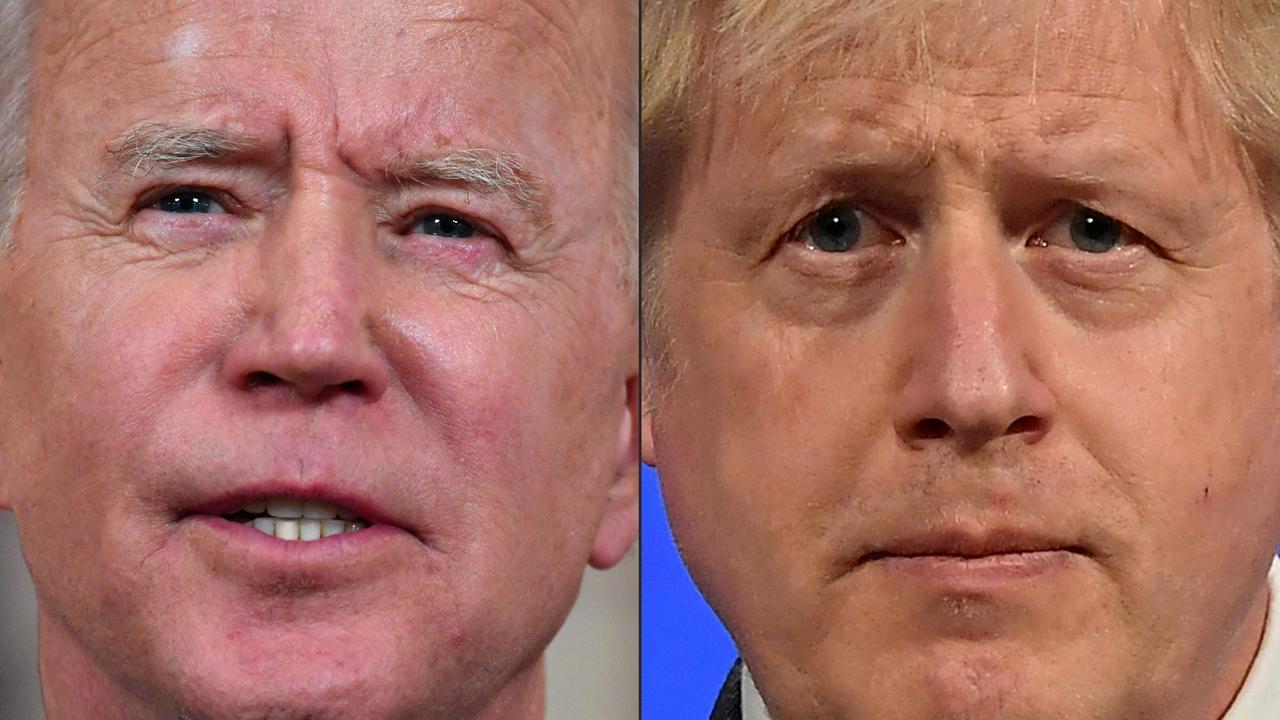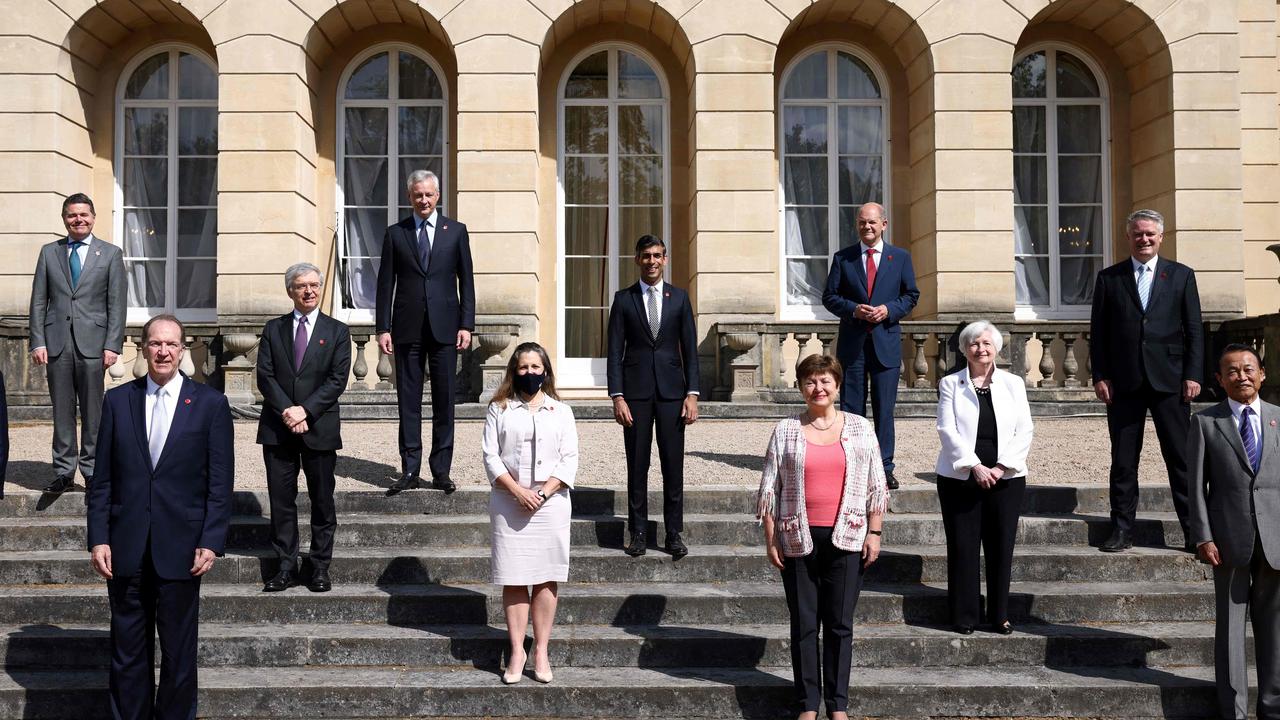G7 summit UK: How Australia could benefit and where it could be criticised
This weekend, Scott Morrison will meet Joe Biden and Boris Johnson, which is shaping up to be an unpleasant conversation, with allies “turning on us”.
This weekend, Prime Minister Scott Morrison will swap Australia’s polar blast for the balminess of a seaside resort in England’s south west.
There he will come face-to-face with US President Joe Biden, UK counterpart Boris Johnson and Japanese leader Yoshihide Suga among others at the annual Group of Seven (G7) meeting.
It’s very possible there will slaps on the back between Mr Morrison and Mr Johnson if Australia and the UK sign a much-touted free trade deal which could bring in billions.
But there’s one area where the conversation could get a touch awkward between Australia and all the other G7 leaders in attendance. Our allies could “turn on us”.
“Every G7 country is committed to net zero emissions by 2050. But more importantly, every G7 country has also now strengthened its target to 2030,” head of research at the Climate Council Dr Simon Bradshaw told news.com.au
“Australia’s now really alone among comparable countries in having neither committed to net zero by at least 2050 and also by remaining stubbornly wedded to its very weak 2030 targets.”
Dr Bradshaw said that the pressure will be on the PM and Australia to “pick up its game”.

What is the G7?
The G7 is a meeting of wealthy democratic nations which counts the US, UK, Canada, France, Germany, Italy and Japan as its members.
For a time it also included Russia and was called the G8 until Moscow was kicked out in 2014 due to the annexation of Ukraine’s territory of Crimea.
Australia is not part of the G7 but along with India, South Korea and South Africa will be a guest.
Unsurprisingly Covid-19 will be top of the agenda. India’s president Narendra Modi is joining virtually due to that country’s ongoing outbreak.
G7 leaders have already declared it a success before the summit has even begun, after they agreed on a deal which aims to ensure big companies, like Apple and Amazon, will have to pay a minimum tax rate of at least 15 per cent.

Why is the G7 being held in a remote seaside resort?
Every year, leaders of the seven nations meet for a high powered chinwag. This year, from June 11-13, that summit is taking place in Carbis Bay, a village in Cornwall five and half hours drive from London. It’s so sleepy even many Brits have never heard of it.
But it’s also a signal from the UK that new technology and climate change are central to its future. Cornwall has a burgeoning green technology sector has reduced its carbon footprint by almost 20 per cent with more than one third of its electricity coming from renewables, reported website Cornwall Live.
Most of the events will take place at the luxury Carbis Bay Hotel, in reality a whole estate, which overlooks the Atlantic Ocean
Being sequestered away in Carbis Bay also allows security to be tightened further from a major city and keep pesky protesters from getting too close. The nearby Newquay Airport is handy for various presidents and prime ministers to fly into.
More than 6500 police officers will protect the summit in an operation likely to cost around A$120m

Australia-UK free trade deal could be signed
For Australia, a big win at the summit could be the inking of a free trade deal with the UK. This is an even bigger win for Britain which is desperate to demonstrate its new post-Brexit independent economic policy.
Currently UK-Australia trade amounts to about $37 billion annually. This deal could see that rise with more Aussie beef in British supermarkets and more British scotch in Aussie bars.
There are problems, however. UK farmers are fearful Aussie beef, which they claim is of a lesser quality, could flood the market. That could mean some tariffs and quotas remain – a “free-ish” trade deal, maybe.
Canberra’s high commissioner to the UK George Brandis has said the concerns are “absurd” and a “scare campaign” and it’s more likely Australia would export high end products rather than rump steaks.
RELATED: Australia-UK free trade agreement – who will benefit

Awkward discussions in Carbis Bay
But it’s the future of the planet rather than free trade that will concentrate minds in Cornwall.
A key reason is because the G7 meeting is merely Boris Johnson’s entree to the main course which will be November’s United Nations COP26 climate change summit. Britain will also host this far bigger shindig, in Glasgow.
“There’s going to be a lot of focus on climate change at the G7 going towards Glasgow and Australia is going to get that sustained diplomatic pressure from its international peers,” said the Climate Council’s Dr Bradshaw.
The previous climate summit of this magnitude, in Paris in 2015, led to the Paris Agreement which committed nations to holding any temperature increase to “well below 2C” above pre-industrial levels and preferably to 1.5C.
One of the key ways of reaching that goal was for countries to commit to so-called “net zero emissions”, which around 140 have done, most with a 2050 deadline. The G7 have now made further commitments to reach some goals by 2030.
Dr Bradshaw said Australia’s refusal to commit to such a deadline would likely lead to some uncomfortable G7 discussions.
“They’ve all made very clear they expect more of Australia. But Australia, for some reason, seems to be wanting to count itself out of that club and work against the grain,” he said.
“So that’s now left us in a position where we really are at the back of the pack.”
RELATED: Net zero emissions explained

Further awkwardness came earlier this week when secretary-general of the Organisation for Economic Co-operation and Development (OECD) Mathias Cormann said it was good that more nations were committing to net zero “no later than 2050”.
Which is an interesting about face given the former Australian finance Minister helped axe Australia’s carbon pricing scheme.
The targets the Government does have is to reduce emissions to 26–28 per cent below 2005 levels by 2030. As for net zero, Mr Morrison has said the goal is to achieve it “preferably by 2050”.
A big impediment to reaching net zero is Australia’s continued use of large amounts of coal in power generation.
The PM doesn’t seem all that keen to firm up Australia’s vague goals.
At a speech on Wednesday in Perth, on his way to the UK, Mr Morrison said Australia was not in favour of “false deadlines for phasing out specific energy sources” and that nations should “chart their own path to net zero”.
Although, the Government is now at least talking about net zero.
RELATED: How KitKats have ‘embarrassed’ Australia over net zero

A report by the Climate Council has said Australia should do more, not less. While Australia’s total emissions pale against the US and China, per capita it’s one of the biggest polluters.
Dr Bradshaw many nations were now considering “carbon border tariffs” which would make it more costly for carbon intensive countries to sell goods internationally.
Mr Morrison has rubbished this as a “combative” protectionist policy.
Australia’s reluctance to do more was “maddening,” said Dr Bradshaw, due to the forecasted damage climate change could inflict on Australia’s ecosystems as well as the country’s potential for renewable energy.

A “perfect storm” was brewing, he added, with the climate goals being strengthened, Asian economies doing more and the Glasgow conference imminent.
All of which might be relayed to Mr Morrison by G7 leaders as he sips a cuppa overlooking the golden sands of Carbis Bay this weekend
“We risk doing ourselves, our workers and our economy, a lot of self-harm if we don’t take stronger action,” Mr Bradshaw said.
“Even some of our most staunch and traditional allies are now turning on us and saying you’ve got to pick up your game.
“The pressure is now on Australia”.




